Knowing the difference between “in the last year,” “last year,” and “in the past year” isn’t that difficult. All three phrases are the same, but the challenge comes from knowing why we have them and when it’s best to use one over another, which this article will explore.
Should I Use “In The Last Year,” “Last Year,” Or “In The Past Year”?
You should use “last year” if you want to talk about the year that happened immediately before the current one. It’s the most common one to use. You might also use “in the last year” or “in the past year” for the same reason, though they’re less common.
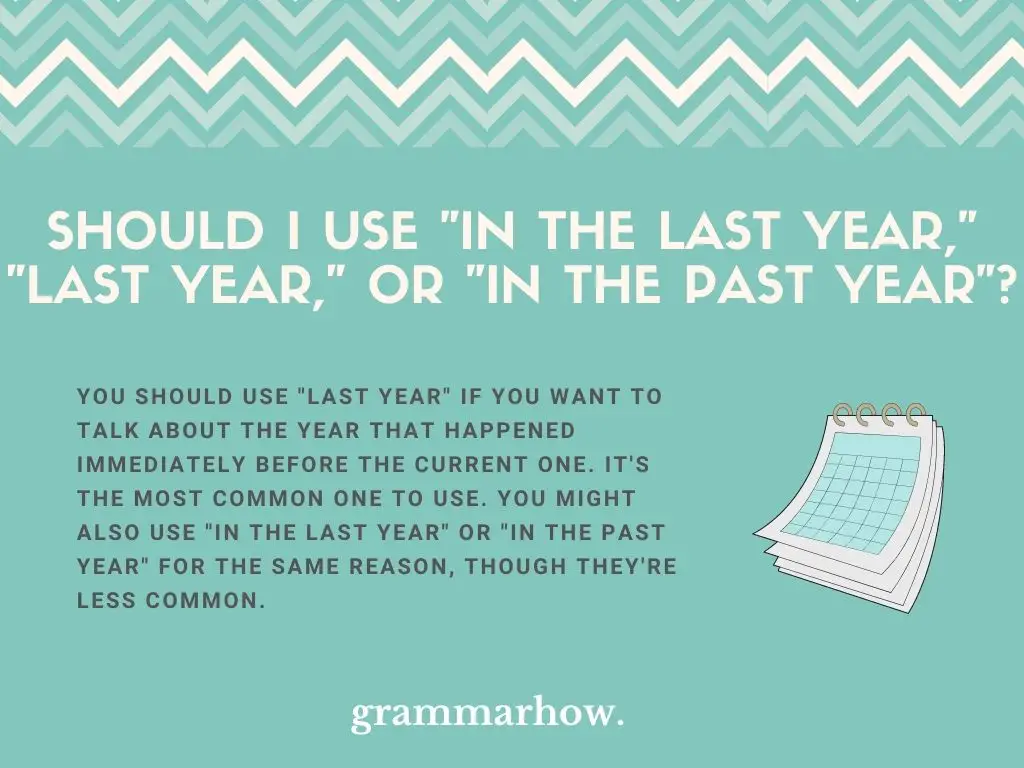
As you can see from this graph, “last year” is by far the most popular choice of the three. That’s because it’s quick and to the point with delivering the audience with “when” something happened.
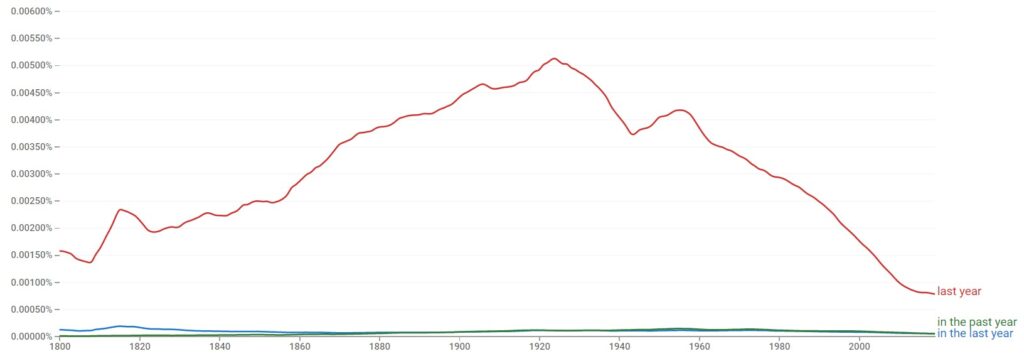
The three phrases mean the same thing with little to no variation between them. Their meaning is simply that we’re referring to the previous year compared to the one we’re currently in. What that means isn’t important; it’s how you use each one that tells them apart.
Examples Of How To Use “In The Last Year” In A Sentence
We’ll start by looking at some examples of them all. As we’ve mentioned, they all mean the same thing. For that reason, you can use each one interchangeably with little to no issue. No native speaker is going to think you’ve mistaken the phrases if you choose one over another.
“In the last year” is the most likely candidate for the original phrase of the three. It indicates exactly when something happened by using the preposition “in.”
- In the last year, our profits have nearly tripled.
- I’ve noticed that you don’t care much about us as a family anymore in the last year.
- In the last year, you’ve made it difficult for me to get what I want out of you.
- I found the love of my life in the last year.
- In the last year, unemployment rates have doubled, and it’s all because of you.
We use “in the last year” to show when something happened in the year directly before the current one. The preposition “in” is most common to use with “year” because it’s talking about being inside the months of the year as a time concept.
Examples Of How To Use “Last Year” In A Sentence
Now let’s go over “last year.” It’s likely that you’ll hear and see this one more often than any of the other options. That’s because many native speakers like to simplify their speech and writing by removing redundant words and unnecessary letters.
“Last year” is a shortened version of “in the last year.” We can drop the preposition “in the” while still retaining the information that we’re talking about the previous year.
- Last year, you helped me out with something, and it’s time to repay you.
- I didn’t notice much had changed last year.
- Last year, there was clearly a time when everyone cared, and now that’s gone.
- Last year, my profit margin was made much larger.
- We became closer than we ever have before last year.
“Last year” is more straightforward to use than “in the last year.” To most native speakers, “in the” is seen as redundant, making it useless to say in most cases of sentences and situations.
Many native speakers prefer to keep their language simple and use phrases like “last year” to do exactly that.
Examples Of How To Use “In The Past Year” In A Sentence
Finally, let’s look at the least popular choice of the three, “in the past year.” It’s not common for people to use “past” as the adjective in this phrase because it usually refers to multiple previous instances rather than specifically the last year.
“In the past year” means the same thing as the other two phrases but is the least popular. “Past” isn’t synonymous with “last,” which is why most native speakers avoid using it.
- In the past year, a lot of things have changed, and we need to address them.
- You’ve done a lot differently in the past year, and I like it.
- This isn’t how it happened in the past year.
- In the past year, it was made clear that we wouldn’t be working together again.
- In the past year, the admittance rate has quadrupled.
As you can see, “in the past year” doesn’t work as well as “in the last year,” even though they both mean the same thing. It’s not likely that native speakers will use this one, so you don’t have to worry too much about learning it.
Is It Correct To Say “For The Last Year”?
The preposition you use might change based on the context of your sentence. For that reason, we think it’s important to know whether “for the last year” works as well as “in the last year.”
According to this graph, “for the last year” is correct to say, though it’s not as common as “in the last year.”
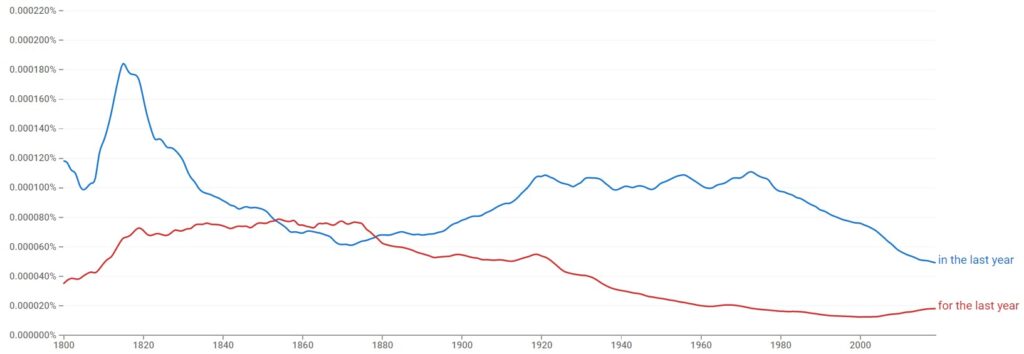
While it is correct, it’s not common. That’s because the situations where “for” works instead of “in” are rarer to come by. We use “for the last year” to talk about something that has happened over the course of the previous year rather than something that specifically happened at one point.
The same rule applies with “for the past year,” where we only use it when talking about something that happened throughout the previous year.
- For the last year, you’ve been causing me trouble.
- For the past year, I haven’t been able to look him in the eye.
Is It “Last Of Last Year” Or “Year Before Last Year”?
The tricky part comes in when we reference the year before last, and many people struggle with which sentence structure works best.
According to this graph, “year before last year” is the more popular phrase. “Last of last year” was historically more popular, but it’s rarely used today compared with “year before last year.”
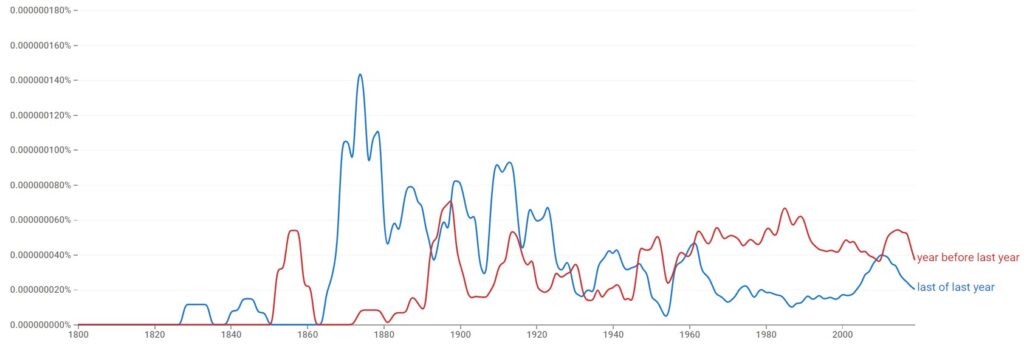
Most native speakers actually say neither of the above phrases, and they don’t say “last years last” either. Instead, they’ll use “year before last” to keep it as simple as possible. We can also see that from this graph.
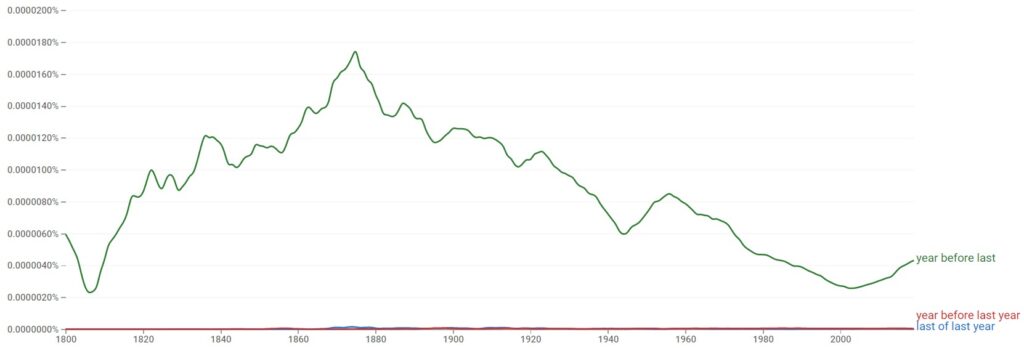
Is It Ever Correct To Use “In Last Year”?
Generally, when we write “in” as the preposition for “last year,” we have to specify it with the word “the.” However, is it possible to use “in last year” without any other specification?
“In last year” is not correct to use, and this graph shows that it’s very uncommon. There was a case in the early 1900s where people tried to introduce it, but it didn’t take off at all.
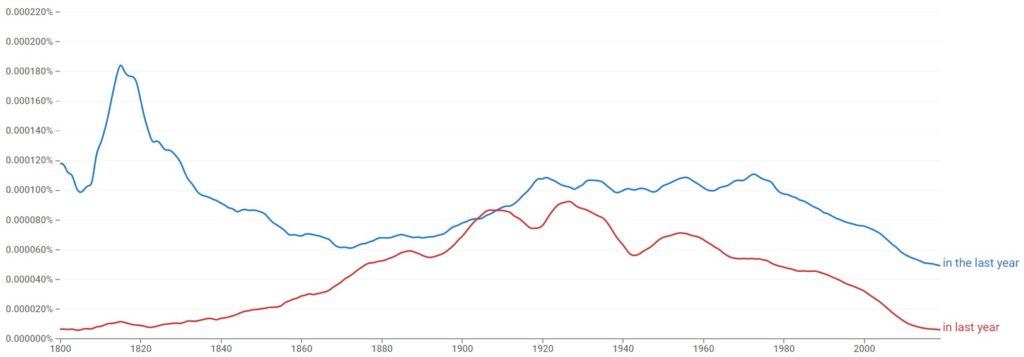
Is It “In The Last Year” Or “On The Last Year”?
Also, when using the correct preposition, it’s important that we only write “in.” “On” is not usually correct to write.
According to this graph, “on the last year” is never used. “On” is the incorrect preposition to use because it doesn’t reference the time within the year in any way.
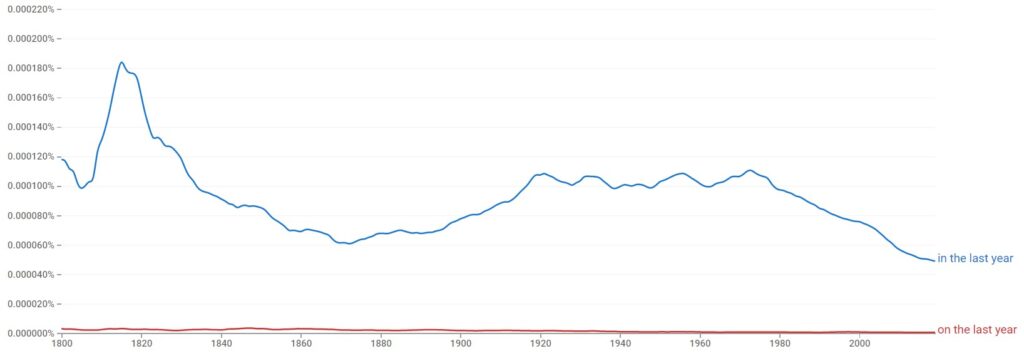
What Does “Within The Last Year” Mean?
We might also hear “within the last year.” Generally, we use “within” when we’re trying to narrow down a time frame for something, but we’re not entirely sure when it happened.
“Within the last year” means that we know something happened last year, but we’re not entirely sure when it happened. We can give it a rough estimate, but it’s up to everyone else to try and figure it out.
- Within the last year, he managed to change their views.
- At some point within the last year, she fixed her errors.
When Should I Use “In The Last Years”?
Typically, “in the last year” refers to the year immediately prior to the one we’re currently living in. Of course, we don’t always have to refer to one year, and sometimes we might use the plural form.
You should use “in the last years” when you want to talk about more than one year that’s relevant. It could be something that’s taken a while to create and has taken a number of previous years to start working properly.
- In the last years, I’ve made myself quite wealthy.
- In the last few years, this house has been slowly dying!
As you can see, you can use phrases like “in the last years” or “in the last few years” if you want to be slightly more specific about the number of previous years you’re talking about.
“Last Year” And “Past Year” – Synonyms
It might help you to look into some synonyms and alternatives. If you’re struggling with knowing how “last year” and “past year” are used, one of these might be more beneficial to you.
- Previous year
- Yesteryear
- Preceding year
- Year prior
- Latest year
Generally, “last year” works really well, so it’s not often you’ll come across one of these synonyms. Still, they’re good to learn if you’re uncomfortable figuring out when “Last year” and “past year” work better.
You may also like:
In Recent Years vs In The Recent Years – Easy Usage Guide (+11 Examples)
“In The Last Month” vs. “Last Month” – Difference Explained
